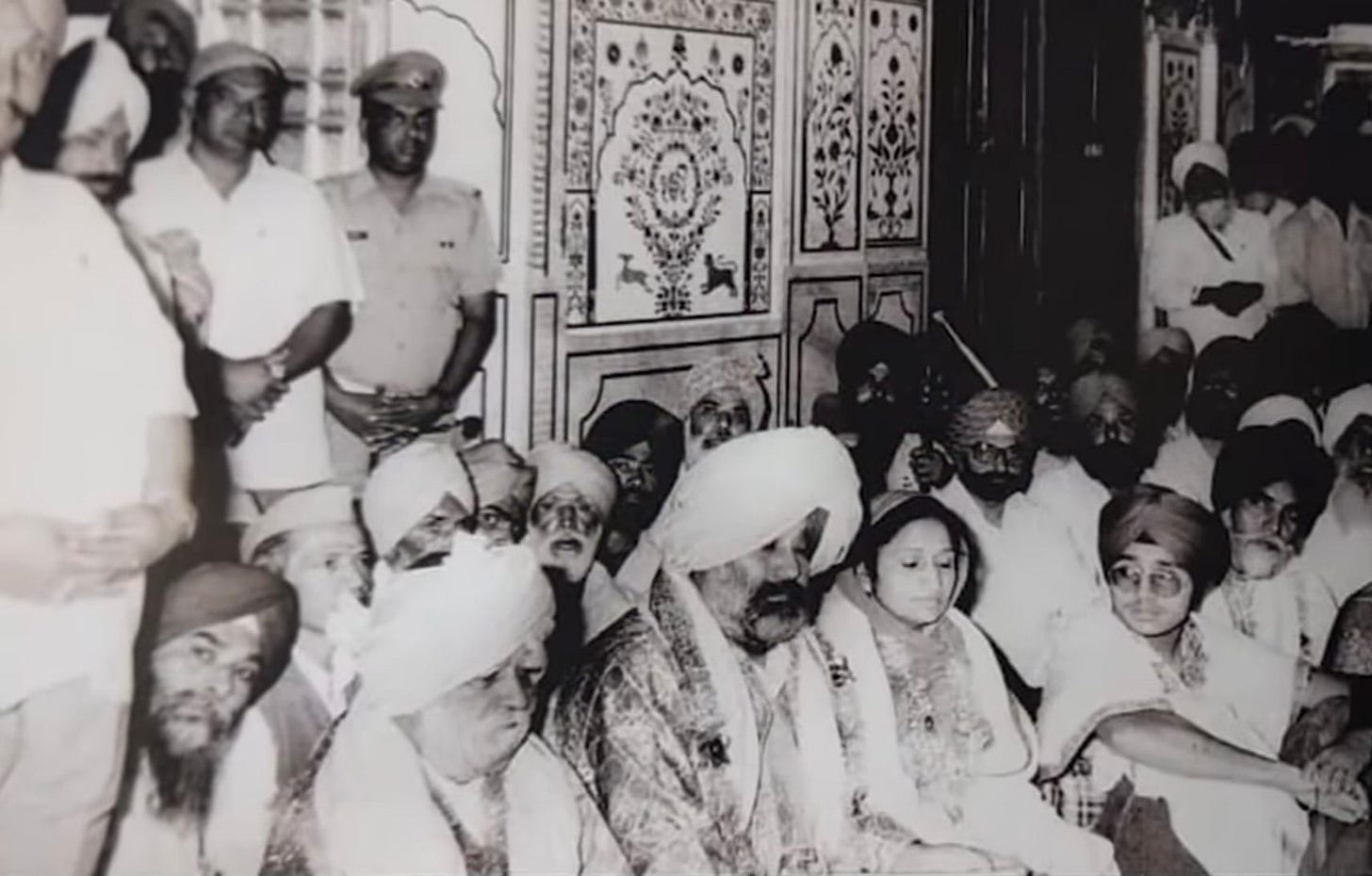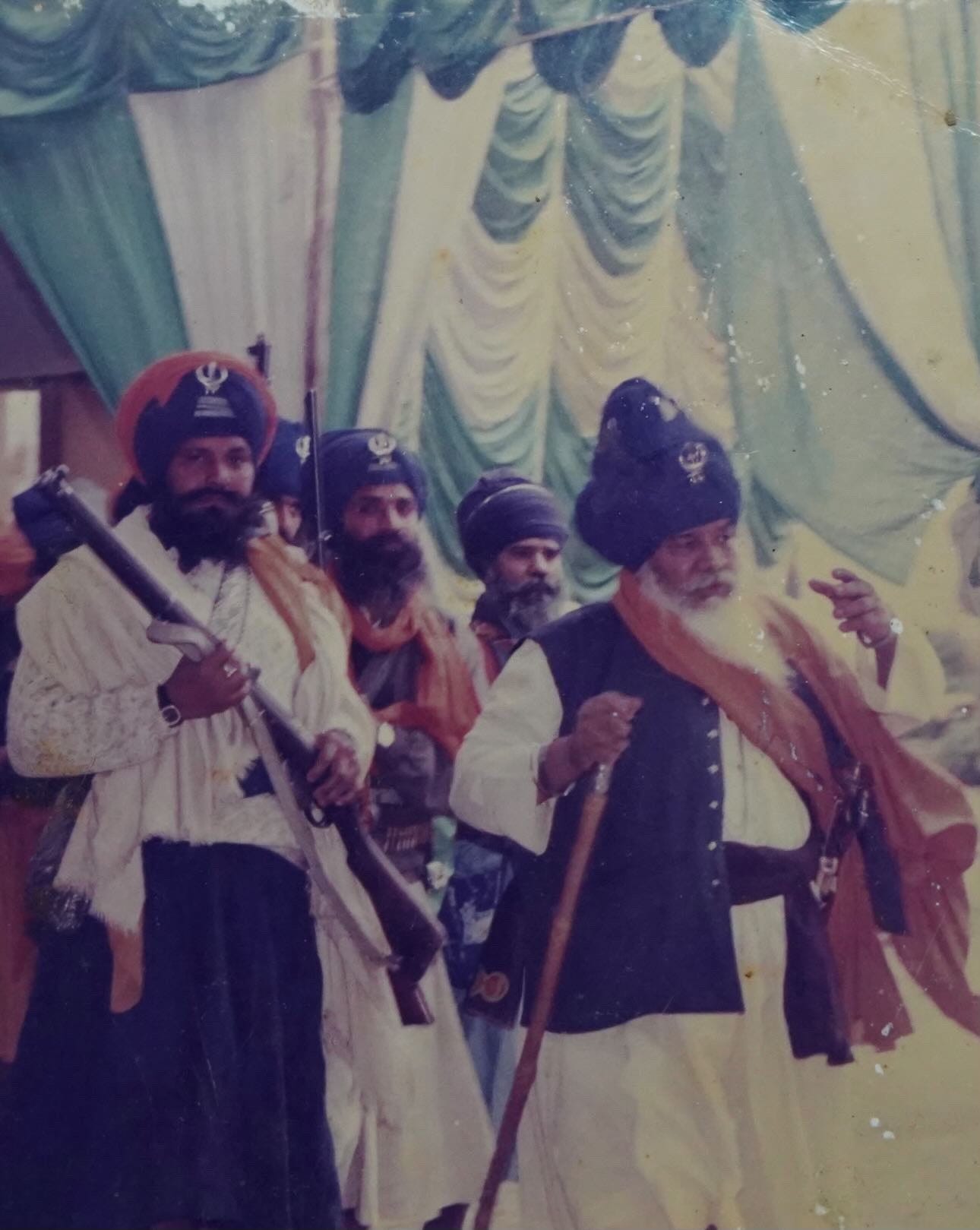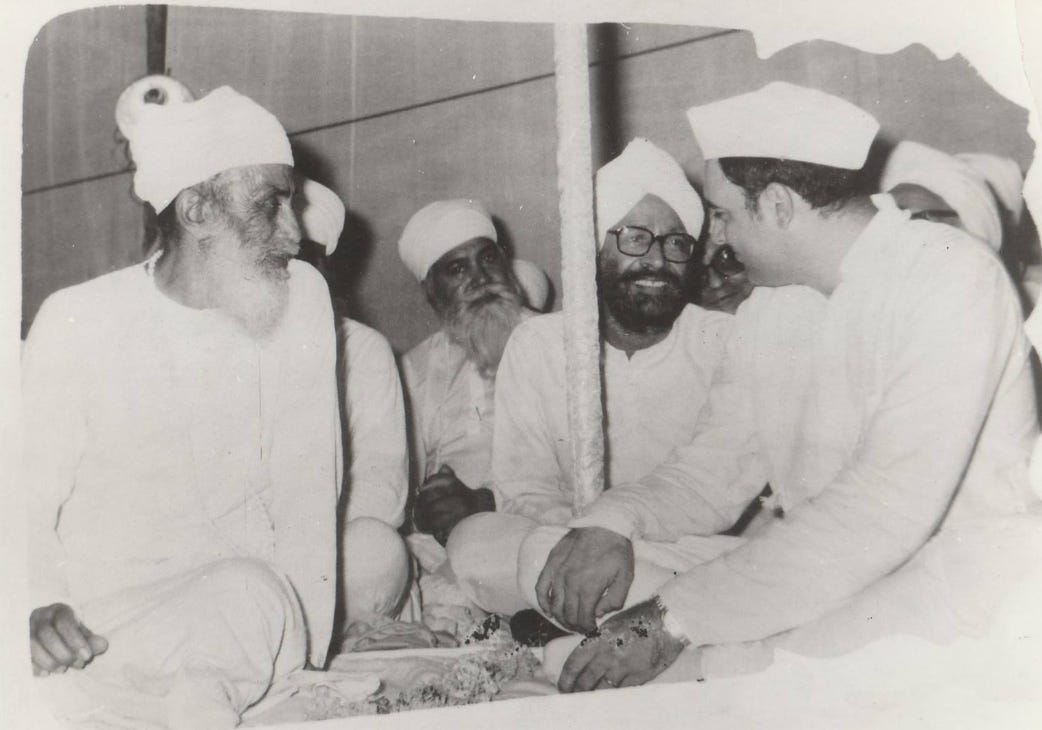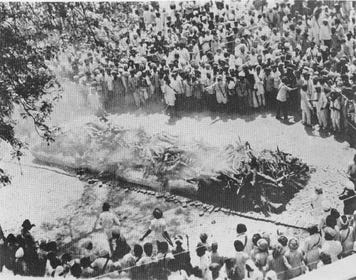The Sikh response to The Emergency
Exploring how various Sikh groups including the Shiromani Akali Dal, Damdami Taksal and Budha Dal responded to the Emergency and the aftermath.
Overview
The Emergency was a period where the prime minister of India, Indira Gandhi, had declared a state of emergency, lasting from June 1975 to March 1977. The Emergency was carried out due to a myriad of reasons; Indira Gandhi cited mass political opposition, national instability and a downturn in the nation’s economy as reasons to carry out the Emergency. The Emergency is infamous for the curtailment of civil rights including incarceration of political opposition, forced vasectomies and unlawful modifications to the constitution.
In response to this, the Akalis launched the Democracy Bachao Morcha to oppose the authoritarian tendencies of the Congress. Before the Emergency, a meeting was arranged between Akali leaders including Parkash Singh Badal and Gurbachan Singh Tohra and Congress leaders including Indira Gandhi and Giani Zail Singh about the Emergency. In the meeting, it was discussed that three religious demands will be passed. According to Dr Jaspal Singh, a DSGMC member, the Akalis would have supported the Emergency in exchange for special concessions. The Emergency remains an event that is almost universally rebuked by Sikh groups, even those who have a history of supporting the Congress.
Response from Sikh groups
Shiromani Akali Dal
As mentioned before, the Akalis posed a serious challenge against the Emergency; seeing it as undemocratic and encroaching on civil rights. Hence, despite any promises, the Akalis still chose to be against the Emergency. The 75th anniversary Akali Dal pamphlet talks in detail about how Akali leaders stood up against the draconic measures of the Emergency:
ਸ੍ਰੀ ਜੈਪ੍ਰਕਾਸ਼ ਨਾਰਾਇਣ ਅਤੇ ਵਿਰੋਧੀ ਧਿਰਾਂ ਦੇ ਸਾਰੇ ਪ੍ਰਮੁੱਖ ਆਗੂਆਂ ਨੂੰ ਜੇਲ੍ਹਾਂ ਵਿਚ ਸੁੱਟ ਦਿੱਤਾ ਗਿਆ ਸੀ ਅਤੇ ਸਾਰੇ ਦੇਸ਼ ਵਿਚ ਦਹਿਸ਼ਤ ਫੈਲਾ ਦਿੱਤੀ ਗਈ ਸੀ। ਉਸ ਵੇਲੇ ਸ਼੍ਰੋਮਣੀ ਅਕਾਲੀ ਦਲ ਨੇ ਇੰਦਰਾ ਗਾਂਧੀ ਦੀ ਤਾਨਾਸ਼ਾਹੀ ਨਿਅਤ ਅਤੇ ਮੱਨੁਖੀ ਆਜ਼ਾਦੀ ਦੇ ਖਿਲਾਫ ਵਰਤੀ ਜਾਣ ਵਾਲੀ ਐਮਰਜੈਂਸੀ ਦੇ ਵਿਰੋਧ ਵਿਚ ਉਸ ਵੇਲੇ ਤਕ ਮੋਰਚਾ ਲਗਾਈ ਰਖਿਆ ਜਦੋਂ ਤੀਕ ਉਸਨੂੰ ਹਟਾ ਨਹੀਂ ਲਿਆ ਗਿਆ।੧੯ ਮਹੀਨਿਆਂ ਦੀ ਇਸ ਘੋਲ ਵਿਚ ਸਾਰੇ ਉੱਘੇ ਅਕਾਲੀ ਲੀਡਰਾਂ ਸਮੇਤ ਤਕਰੀਬਨ ੪੦,੦੦੦ ਅਕਾਲੀ ਵਰਕਰਾਂ ਨੇ ਆਪਣੀਆਂ ਗ੍ਰਿਫਤਾਰੀਆਂ ਦਿੱਤੀਆਂ ਸਨ।
Mr Jayaprakash Narayan and other leaders of opposition parties were jailed and a sense of terror prevailed across the country. At that time, the Shiromani Akali Dal stood up against Indira Gandhi’s draconic ways and the Emergency was being used to suppress human rights until her removal. In this 19 month struggle, it is estimated 40,000 Akali workers were arrested.
The first day that The Emergency was imposed, a meeting was held by top Akali leaders in Amritsar. The very same day, leaders like Gurbachan Singh Tohra, Jagdev Singh Talwandi and Parkash Singh Badal decided to launch a morcha against it and Jathedar Mohan Singh Tur, the president of the party, was appointed the ‘dictator’. Akali Dal workers themselves courted arrest; all these leaders were jailed for up to 19 months. Every day a batch of Akali volunteers would assemble at Darbar Sahib, receive saropas and perform an ardas and then go out and march to police stations, shouting anti-Emergency slogans. By the end of 1975, 100 to 150 volunteers would court arrest every single day. After Mohan Singh Tur’s arrest, Sant Harchand Singh Longowal took over the helm by acting as temporary ‘dictator’.

As the Emergency progressed, conditions in jail became relaxed between prisoners. Whilst in jail, Badal began to speak to the other political prisoners about forming an opposition group to Indira Gandhi’s Congress and the idea of the Janata Party was made, a party that works for the people. According to Amarjit Narang’s Region, Religion and Politics: 100 Years of Shiromani Akali Dal, Atma Singh claimed that the Janata Party initiative was an idea formulated by Parkash Singh Badal:
One of the senior Akali leaders Atma Singh, in fact, claimed that the initiative for the formation of Janata Party was, in fact, made by Prakash Singh Badal. Atma Singh, who was in detention along with Badal, in the Delhi jail during the Emergency, told a news correspondent that on 6 February 1976 Badal hosted a lunch for about 409 political detenus which marked the beginning of a dialogue.

In the 1977 elections, the Janata Party came to power with an alliance with the Shiromani Akali Dal, running under a platform of democracy and retaining civil liberties. Indira Gandhi would lose her home seat of Rae Bareilly to Raj Narain, with the Congress Party not even receiving one seat in states like Punjab, Haryana, Bihar (including Jharkhand), Uttar Pradesh (including Uttarakhand) and Himachal Pradesh. The Akali morcha was successful in its aim at repealing the Emergency and removing Indira Gandhi from power.
“We did not expect such a welcome. When the jail gates opened, we were amazed at the tumultous reception we received. It was spontaneous and overwhelming. There was no notification about our release but news had spread by word of mouth and caught on like proverbial wildfire. We were loaded with garlands and seated in different cars…People were jubilant. They shouted slogans in gay abandon. Every village had set up reception committees to greet us. Langar arrangements were made and our cars were loaded with fruit and sweets. At one village the sarpanch forced us to drink a glass of milk each and gifted us with hundred-rupee notes as a token of the villagers’ affection..Our party symbol, the scales, could be seen everywhere. A roadside cobbler fished through his day’s earnings and produced a soiled one-rupee note and handed it to me. I did not refuse as it would have made him unhappy. Tears welled up in his eyes as well as mine as I accepted his token offering. That one-rupee note is still with me.”
- Surjit Singh Barnala on the release of Akali leaders fom jails after the culmination of the Emergency.
Budha Dal
As per a speech given by Jathedar Santa Singh of Budha Dal after Operation Blue Star, he claimed Budha Dal was staunchly against the tyranny of the Emergency. According to his account, SGPC members visited him to seek amends to pursue unity between all Sikh factions but were later backstabbed by Akali leaders like Barnala.
He went to Delhi to celebrate a Jor Mela for the ex-Budha Dal Jathedar, Baba Sahib Singh Kaladhari’s barsi (death anniversary). The Budha Dal entered Delhi, beating drums and seated on top of horses; they marched through large Delhi bazaars, armed with rifles and spears. They briefly stopped at Bangla Sahib, where the DSGMC helped them and provided them with langar. One of Indira Gandhi’s spokesmen told Baba Santa Singh to immediately stop processions but they refused. Indira Gandhi threatened them that the army will be forced to come and the Jathedar replied we are an army ourselves.

Also during the Emergency, the film made by and starring Dara Singh, Sava Lakh Se Ek Ladaun, was repeatedly censored due its allegorical storyline relating to the tyranny of governments. Jathedar Santa Singh repeatedly refused for the film to be given clearance to be released, citing the reason of an actor shown with a farla (Sign of merit among Nihangs) upon his dumalla. Budha Dal jathas turned up to oppose the film wherever it was was aired, including Hoshiarpur and Amritsar, threatening bloodshed. After a few years, the film was released in 1979 and Jathedar Santa Singh apologised to Dara Singh; Jathedar Santa Singh had distanced himself politically from elements like Giani Zail Singh, who offered solutions for the film’s release during the Emergency itself.
Damdami Taksal
During the mid 1970s, the Damdami Taksal gained prestige among certain sections of rural Punjab through their rejection of the Emergency. Sant Kartar Singh Bhindranwale of the Damdami Taksal would lead peaceful protests against the imposition of the Emergency, all peaceful demonstrations. He would carry out proselytising activities through many villages in a chalda vaheer (constantly roaming) jatha and would even set up nagar kirtans during monumental occasions, as the Emergency was ongoing.
During the Emergency, the 300th anniversary of Guru Tegh Bahadur’s shaheedi took place in Anandpur Sahib. There were up to 2.2 million people who had attended and even Indira Gandhi gave a speech on the platform there. Sant Kartar Singh Bhindranwale criticised Indira Gandhi publicly on stage, causing animosity between the two later on.
At this point, the Damdami Taksal leaders were aligned with the Shiromani Akali Dal; Sant Kartar Singh Bhindranwale retained good relations with the president of Akali Dal, Jathedar Mohan Singh Tur. They played a key part in Akali plans for creating panthic unity against the Emergency.
Namdharis
Ever since independence, Namdharis were aligned politically with the Congress Party. Hence, it was natural that apart from a brief schism with the Punjab CM, Partap Singh Kairon, they remained staunch allies with the Congress. However, when the Emergency was passed, even Namdhari leaders were thrown into a moral crisis. Morally, they could not accept Indira Gandhi’s authoritarianism and weren’t able to ignore the beseeches of their rural following against the crackdown on civil rights.
The Namdhari leadership wanted to remain politically neutral yet even they put out a statement saying that the imposition of the Emergency was a mistake on the behalf of Indira Gandhi. After the end of the Emergency, they retained their close relationship with the Congress despite critiquing them for the curtailing of civil rights.
Aftermath
The crocodile is set upon devouring you all, and you wish to negotiate with it?
- Jathedar Mohan Singh Tur, president of Shiromani Akali Dal, outside the Akal Takht on the 9th of July, 1975 before courting arrest in defiance of Indira Gandhi’s “Emergency.”
The Congress Party was later ousted by an anti-Congress coalition spearheaded by the Janata Party, allied with Shiromani Akali Dal. This coalition later fell due to ideological inconsistencies within and Indira Gandhi came back to power in the 1980 general elections. It became common knowledge that Congress was at odds with Akalis due to their protests against the Emergency and they began working on supporting groups against the Akalis in the SGPC elections, including the short-lived Panth Khalsa, containing Jathedar Santa Singh of the Budha Dal and Jagjit Singh Chauhan, an ex-Congress politician and among the first supporters of an independent Sikh state.
This would lead many of the Sikh groups aligned with Akalis turning into foes. The Damdami Taksal would gain prominence under the 1978 Nirankari clash, where the Damdami Taksal opposed the march of Nirankaris in Amritsar, on the day of Vaisakhi. Appalled with the inaction of erstwhile Akali CM of Punjab, Parkash Singh Badal, the Damdami Taksal slowly started becoming ideologically opposed to the Akalis. This would set into motion the basis for the events leading up Operation Blue Star and Sikh insurgency in Punjab.






